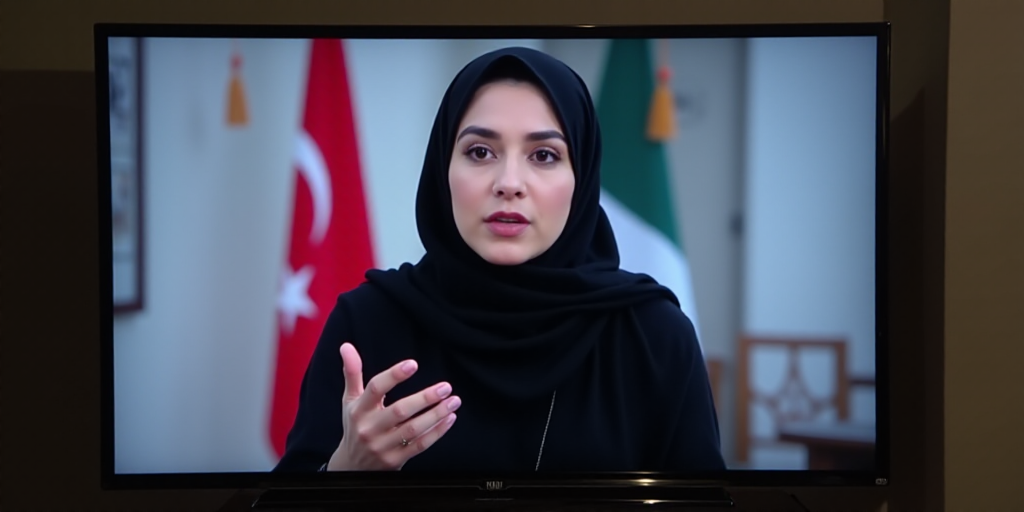Background and Key Players
The ongoing conflict between Israel and Iran has reached a new level of intensity, with both nations engaging in military confrontations. The tension stems from decades of indirect warfare and sporadic operations, but this marks the first time they have directly clashed with such fervor.
Israel’s Defense Minister, Israel Katz, declared that they would target Iranian dictator Ali Khamenei “everywhere.” This statement came after Israel launched an unprecedented attack against Iran, aiming to prevent the country from acquiring nuclear weapons—a claim that Iran has consistently denied, asserting its right to a civilian nuclear program.
Israeli Attacks on Iran
On the fourth day of hostilities, Israel targeted the Iranian state television building in Tehran, causing a brief interruption in broadcasting and explosions heard by AFP journalists across various parts of the capital. During the attack, a state television presenter criticizing Israel’s offensive was seen quickly leaving the studio amidst thick dust and falling debris, as captured by Iranian media outlets.
Israel’s strikes have also hit several Iranian cities, resulting in at least 11 fatalities according to emergency services. Tel Aviv suffered significant damage, with firefighters searching for possible survivors among the wreckage. The attacks extended to Petah Tikva, Bnei-Brak (near Tel Aviv), and Haifa in northern Israel, with missiles reaching their targets.
The consequences of these Israeli attacks have been severe, with at least 24 deaths and over a thousand injuries reported in Israel since Friday, according to the Ministry of Health. In Iran, the death toll has risen to 224, with more than a thousand wounded.
Iranian Retaliation
In response, Iran condemned the bombings as “war crimes” and called for action from the United Nations Security Council. Tehran’s main bazaar remained closed, and most businesses stayed shut, with long lines forming at gas stations as people stockpiled supplies. One vendor reported running out of water amidst the chaos.
Iranian forces launched missiles towards northern Israel, prompting residents to seek shelter. The escalating conflict has claimed the lives of high-ranking Iranian officials, including the head of the Islamic Revolutionary Guard Corps and the Chief of Staff of the Iranian Armed Forces, along with nine scientists from the nuclear program.
“Llegar a un acuerdo”
Amidst the intensifying conflict, Iranian President Hassan Rouhani urged national unity against what he called a “criminal aggression.” International calls for de-escalation have included statements from U.S. President Donald Trump, who reiterated that the United States has no involvement in Israel’s campaign but warned of a strong response should Iran attack U.S. interests.
Trump has urged Iran to return to the negotiation table, emphasizing that a deal would be difficult for both parties but necessary. Iranian Foreign Minister Javad Zarif suggested that a simple phone call from Washington could halt Israel’s attacks and pave the way for diplomacy. A high-ranking U.S. official revealed that Trump intervened to prevent Israel from assassinating Iran’s Supreme Leader, Ayatollah Ali Khamenei.
Despite these calls for diplomacy, Israeli Prime Minister Benjamin Netanyahu has maintained that eliminating Khamenei would end the conflict, as stated in an interview with ABC News.
Key Questions and Answers
- Who is involved in the conflict? The ongoing conflict pits Israel against Iran, with both nations engaging in military confrontations.
- What sparked the current tensions? The conflict stems from decades of indirect warfare and sporadic operations, with Israel launching an unprecedented attack against Iran to prevent the country from acquiring nuclear weapons.
- What have been the consequences of these attacks? The Israeli strikes have resulted in at least 24 deaths and over a thousand injuries in Israel, while Iran has reported 224 fatalities and more than a thousand wounded.
- How have international leaders responded? International calls for de-escalation have included statements from U.S. President Donald Trump, who urged Iran to return to the negotiation table while warning of a strong response should Iran attack U.S. interests.
- What role has the United States played in the conflict? The U.S. has maintained that it has no involvement in Israel’s campaign against Iran but has warned of a strong response should Iran attack U.S. interests.
- What is the status of nuclear negotiations between the U.S. and Iran? Negotiations were interrupted abruptly following Israel’s attack, and there have been calls for Iran to return to the negotiation table.






